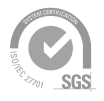What Is a Zero-Knowledge Proof?
A Zero-Knowledge (ZK) proof is a method of authentication where one user can prove the authenticity of certain information without conveying any extra information. In short, a ZK proof allows private information to be kept private during an exchange.
To perform a ZK proof, three basic requirements must be met: completeness, soundness, and zero-knowledge. Completeness is the ability of the prover to demonstrate their knowledge of certain information. Soundness refers to the ability of the verifier to determine whether the prover genuinely possesses the information. Lastly, what determines a zero-knowledge proof is achieving both completeness and soundness without any additional information.
The concept of a ZK proof is commonly applied when privacy and security are of the utmost importance. For instance, authentication systems can employ a ZK proof to verify the credentials and identities of their users without revealing the information. The ZK proof can also be used for privacy-focused cryptocurrencies like Zcash, which uses a variation of ZK proof known as the Zero-Knowledge Succinct Non-Interactive Argument of Knowledge (ZK-SNARK).




